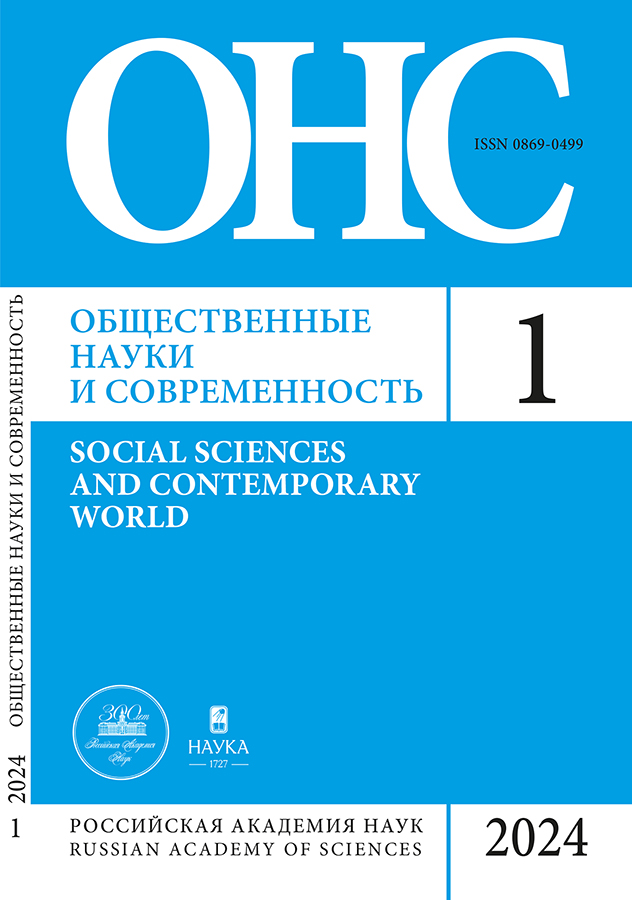Anti-war forces of the FRG in 2022–2023: is their alliance possible?
- Authors: Pogorelskaya S.V.1,2
-
Affiliations:
- Боннский университет
- Институт научной информации по общественным наукам РАН
- Issue: No 1 (2024)
- Pages: 106-119
- Section: German studies
- URL: https://clinpractice.ru/0869-0499/article/view/676315
- DOI: https://doi.org/10.31857/S0869049924010082
- EDN: https://elibrary.ru/RRGLNC
- ID: 676315
Cite item
Abstract
A few years ago it was believed that the anti-war movement, which represented a real force in the era of nuclear confrontation between two military blocs, was not adequate to counter new threats – local wars and Islamic terrorism. The revival of the movement in the spring of 2022 was met with hostility by the political authorities of Germany and the mainstream media, despite its initial apparent inoffensiveness to the official course of the government in the Ukrainian crisis. However, in 2022, anti-war public initiatives began, which in February 2023 turned into a mass demonstration for peace, and also intensified the so-called “Easter marches”. These events showed that the anti-war movement has broad electoral potential and could turn into a political force or at least into an alliance of certain forces on a common anti-war platform. The analysis of modern German anti-war forces is presented and the possibilities of their situational alliance with supporters of left and right populism are investigated. The purpose of the study is to determine the domestic political relevance of such unions. It is concluded that today such a temporary union is fragile and it can be destroyed. The relevance of the study is due to the importance of anti-war themes for the identity of modern Germany, as well as the geopolitical significance of this nation in the balance of forces of the modern West.
Full Text
About the authors
Svetlana V. Pogorelskaya
Боннский университет; Институт научной информации по общественным наукам РАН
Author for correspondence.
Email: pogorels@mail.ru
ORCID iD: 0000-0001-9208-5889
Candidate of Political Sciences, Doctor of Philosophy, Senior Research Fellow, Department of Philosophy
Germany, Bonn; 51/21, Nakhimovsky Prospekt, Moscow, Russia, 117418References
- Germany. 2022. Part 1. [V.B. Belov et al.]. Reports of the Institute of Europe of the Russian Academy of Sciences, No. 400. M., 2023.
- Germany. 2021. [V.B. Belov et al.]. Reports of the Institute of Europe of the Russian Academy of Sciences, No. 393. Moscow, 2022.
- Pogorelskaja S.W. Discussion of Habermas’s essay «The Dilemma of the West. War and indignation» in Germany // Social and humanitarian Sciences, Series 3: «Philosophy». M., INION RAS, 2022. No. 4. Pp. 157–165.
- Pogorelskaya S.V. Farewell to Europe. Jurgen Habermas and the Ukrainian crisis // Man: Image and essence. Humanitarian aspects. M., INION RAS, 2022. No. 4. Pp. 168–181.
- Timoshenkova E.P. Challenges for the Party-political system: the future of People’s Parties. Germany. 2019.[V.B. Belov et al.; ed. by V.B. Belov]. Moscow: Institute of Europe of the Russian Academy of Sciences , 2020. Pp. 27–41.
- The economy and politics of Germany a year after the elections. Reports of the Institute of Europe. No. 360. Moscow, 2019.
- Habermas J. Das Dilemma des Westens. Krieg und Empörung. Süddeutsche Zeitung. München, 2022. 24 April. Ausgabe Deutschland, S. 12. https://www.sueddeutsche.de/projekte/artikel/kultur/das-dilemma-des-westens-juergen-habermas-zum-krieg-in-der-ukraine-e068321/?reduced=true (accessed 28.04.2023).
- Habermas J. Ein Plädoyer für Verhandlungen. Süddeutsche Zeitung. München, 2023. 19 Februar. https://www.sueddeutsche.de/projekte/artikel/kultur/juergen-habermas-ukraine-sz-verhandlungen-e159105/?reduced=true (accessed 28.04.2023).
- Maul H.-W. Deutschland als Zivilmacht. Handbuch zur Deutschen Außenpolitik. Wiesbaden, Springer. 2007. Pp. 73–84.
- Müller O. Pazifismus. Eine Verteidigung. Reclam, Ditzingen 2022. 116 p.
Supplementary files










